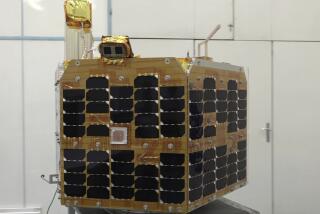3rd World Sets Sights on Space
- Share via
At Nigeria’s mission control -- really a small, windowless office lined with desktop computers in the country’s capital, Abuja -- 15 aerospace engineers are preparing for a historic moment.
The engineers, many of them recent graduates, will this week begin receiving pictures of Earth beamed from Nigeria’s first satellite.
For the record:
12:00 a.m. Nov. 5, 2003 For The Record
Los Angeles Times Wednesday November 05, 2003 Home Edition Main News Part A Page 2 1 inches; 36 words Type of Material: Correction
Space exploration -- A chart accompanying an Oct. 14 article in Section A about space exploration omitted Japan and a consortium of 15 European nations from a list of countries that have sent a lunar probe.
Nigeria is a country where about 1% of the population has working telephones. Nevertheless, the satellite is “a matter of great national pride,” said Solomon Olaniyi, spokesman for Nigeria’s nascent National Space Research and Development Agency. While the space event won’t quite muster the same attention as a World Cup soccer match, “the nation will be watching,” he said.
Since the Columbia space shuttle disaster in February, the U.S. has been engaged in an intense debate over the future of its space program.
But for the majority of the world, space is still considered the ultimate frontier. Leaving the confines of Earth bestows pride and bespeaks technological clout. Satellite launches, almost routine in the U.S., grab headlines and garner live-television coverage elsewhere much the way the first Apollo missions captured Americans’ imagination four decades ago.
Dozens of countries are racing to reach space before their neighbors -- or their foes.
Leading the pack is China, which is expected to send an astronaut into orbit this week on the Shenzhou 5, or “Divine Vessel,” joining the U.S. and the Russians in an elite club that has enjoyed a monopoly on human spaceflight since the early 1960s.
With the launch, the Chinese hope to begin a quest that even the two world powers long ago abandoned -- eventually constructing a permanent human base on the moon.
India has similar ambitions but will focus on sending unmanned probes, first to the moon and then to explore the solar system. Smaller countries, like South Korea and Pakistan, are trying to enter the fray, setting up space programs with hopes of building rockets and launching them from their own facilities.
More than 50 nations have national space programs, according to the United Nation’s Office for Outer Space Affairs.
“Space, at least Earth’s orbit, is no longer the exclusive domain of the few,” said Howard E. McCurdy, a space historian at American University in Washington, D.C.
Staying on the cutting edge of space exploration, of course, is still enormously expensive. The U.S. spends $15 billion a year funding the National Aeronautics and Space Administration. Each shuttle launch costs about $400 million.
But the price tag for simple space missions has dropped from billions of dollars to millions since the Soviet Union launched Yuri Gagarin into Earth’s orbit on April 12, 1961. The engineering know-how can be bought on the open market from any number of private companies.
Space technology has reached the point that even small aerospace companies can attempt human spaceflight. Twenty teams from seven countries, including Mojave-based aerospace pioneer Burt Rutan, are racing to develop a spacecraft that can loft three humans into low Earth orbit, or about 60 miles high. The first firm to do so gets $10 million from a St. Louis-based space advocacy foundation.
By sending up a satellite, a country “immediately becomes a player” on the world stage, said Louis Friedman, executive director of the Planetary Society, a Pasadena-based space exploration advocacy group. “They want to be an economic and technological power in their region, and going to space is a way to show that.”
For some countries, sending up a rocket or a satellite puts them in a special class, “like being a nuclear power without all the politics of having a nuclear program,” said Marco A. Caceres, space analyst for the aerospace research firm the Teal Group.
He noted, for instance, how Nigeria, by launching the refrigerator-size NigeriaSat-1 last month atop a Russian rocket, quickly distinguished itself from other African countries. South Africa, Morocco, Egypt and Algeria are the other African nations that have a presence in space.
Nigerian officials argue that space technology can help the nation overcome some of its earthly problems. For instance, the satellite, built at a cost of $13 million, will provide information about its forest and water resources, as well as allowing government officials to keep track of oil fields. Nigeria is one world’s largest exporters of oil, but thieves tap into pipelines and siphon hundreds of thousands of barrels a day.
Nigeria kick-started its space program by tapping a commercial satellite maker, British-based Surrey Satellite Technology Ltd., which built a micro-satellite and a ground-control station for the country. The contract included 18 months of training, including teaching about a dozen Nigerian scientists how to design, build and operate satellites.
For the Nigerians, the scientists represent the first vanguard of the nation’s space program. “We hope we’ll be able to do more on our own,” said Olaniyi, Nigeria’s space agency spokesman.
Surrey has completed 14 such contracts with countries such as Singapore, Thailand, Malaysia, Portugal, Chile and Pakistan.
“In the past three years, the interest has increased dramatically,” said Sir Martin Sweeting, Surrey’s chief executive.
The capability of the small satellites has also increased dramatically and in some cases are on a par with larger satellites even though they might cost a fraction of the larger ones, Sweeting said.
There could be a big payoff one day for investing in space. China sees its manned spaceflight, scheduled for sometime between Oct. 15 and 17, as a “technological engine” for the development of advanced aerospace capabilities.
China has built one of the largest space programs in the world, with as many as 250,000 people working on the program.
“Space development is a reflection of national strength,” said Liu Jibin, China’s minister for the Commission of Science, Technology and Industry, who told Aviation Week last month that China expected to double its space budget over the next five years as it planned a robotic mission to the moon as early as 2006.
Chinese officials declined to say how much China spends each year on the space program, but Caceres said it is at least $2 billion a year.
Not to be outdone, India announced it will spend more than $100 million to send a 1,100-pound probe, Chandrayan Pratham, or “First Journey to the Moon,” to orbit the lunar body by 2008. The orbiter would take pictures of the surface to make a “chemical” map of the moon, and would be a “forerunner of more ambitious planetary missions in the years to come,” the Indian space agency said. That would include landing robots on the moon and exploring other planets.
“India is ready to take a big leap in science,” Prime Minister Atal Behari Vajpayee said in an Independence Day address to the nation in August.
Some experts see a more sinister motive.
Many of the space programs are actually about building spy satellites to peek in on neighbors, said John Pike, director of the think thank Globalsecurity.org. Many of the countries jumping into space are embroiled in touchy regional conflicts, and a presence in space is considered key to national security. India, for instance, is focused on developing reconnaissance satellites, Pike said, because “they’ve got to worry about Pakistan and China.”
“You can have Turkey looking at Greece and Argentina looking at Brazil, things you couldn’t do before,” Pike said.
The capability to spy on each other could dissolve conflicts by letting countries know what others are doing, said Steven Aftergood, senior research analyst for the Federation of American Scientists.
“A country that has a contested border can derive confidence from certain knowledge that there are no troops building up on the other side,” he said.
But he added that the race to space can also destabilize a region, particularly if one country has capabilities that its foes or neighbors don’t. “The country with the capability might be perceived as having an enhanced targeting ability and thus a military advantage,” he said.
The launch of China’s first manned rocket has been particularly unnerving for its Asian neighbors, mainly because of the secrecy surrounding it.
“The same technology that allows you to go into space is also technology that can be used for missiles and guidance systems,” Friedman said, adding that he saw many similarities between the Cold War-era space race between the Soviets and the U.S. and the flurry of space activities among various longtime regional rivals.
“I see a lot of parallels here,” he said.
Indeed, China’s rocket launch is bound to hasten Japan’s ballistic missile defense program, a Japanese military analyst said Monday.
No wonder, then, that many countries are entering the space race despite significant domestic problems.
For instance, Nigeria and other emerging countries are struggling with impoverished populations. Most villages outside Nigeria’s major cities don’t have running water or electricity, and 70% of the roads are dirt, according to World Bank figures.
Some Nigerians have harshly criticized the project, calling it a waste of money.
“It looks like what could be a white elephant,” said Kayode Fayemi, head of the Center for Democracy and Development, a Nigerian policy think tank. “In the scale of preference, this doesn’t qualify as the most-needed project.”
Fayemi said Nigerians, who have lived most of their lives under brutal military rule, were also wary that the government could use the satellite to spy on citizens and opposition groups.
For all the space fervor, many of the quests have been mired in frustration and tragedy, a reminder of the inherent risks of spaceflight.
In August, Brazil’s third attempt at launching a satellite ended in disaster as the 65-foot VLS rocket exploded on the launchpad, killing 21 people. One of the four solid-propellents detonated for reasons still unknown as Brazilian technicians were performing routine processing tasks.
The mission came as the Brazilian space agency proposed tripling its budget. It had already poured about $300 million into the program.
“A country with the continent-sized dimensions of Brazil cannot live without space technology,” Luiz Bevilacqua, the president of the space agency, said just before the failed launch.
Since the explosion, the program has been suspended indefinitely.
“Even with all the advancements in technology, people forget how difficult and inherently risky spaceflight is,” said Charles Vick, a space policy expert and a former NASA engineer.
*
Times staff writer Davan Maharaj contributed to this report.
More to Read
Sign up for Essential California
The most important California stories and recommendations in your inbox every morning.
You may occasionally receive promotional content from the Los Angeles Times.













